BBC Indonesia 7th March 2023 – Indonesian Workers in the UK: Thousands have lost hope of leaving in 2023
Indonesian workers in the UK have lost hope. Six companies holding licenses to bring in seasonal workers to the UK for the horticulture sector have said they will not take workers from Indonesia for the 2023 harvest season, even though at least 1,100 people are waiting to be redeployed as part of a two-year contract.
Original link: The BBC – Rohmatin Bonasi – Indonesia.
The uncertainty over the fate of Indonesian workers (TKI), or now often called Indonesian migrant workers (PMI) actually started to emerge after the permits of AG Recruitment – a company that acts as a sponsor of workers in the UK and their distributors to plantations in need – were revoked by the British authorities.
In the first shipment from Indonesia in 2022, 1,422 TKI were sponsored by AG Recruitment in collaboration with the company PT Al Zubara Manpower Indonesia (PT AMI).
Around 250 Indonesian citizens did not return to Indonesia after the six-month contract ended, so that around 1,100 people were waiting to depart again. BBC News Indonesia has raised cases of Indonesian citizens running away in the article Indonesian citizens fleeing in the article Indonesian citizens who were former fruit pickers who became illegal immigrants and asylum seekers in the UK , but the numbers at that time were not as complete as the latest data.
In accordance with the two-year work agreement involving PT Al Zubara and AG Recruitment, the PMIs should have departed back to England for the 2023 harvest season starting this April.
Recommended past related BBC Indonesian articles
- Working in England: Hundreds of Indonesian citizens have fled, more than 1,200 workers from Indonesia are in danger of canceling their migration
- Indonesian migrant worker in UK: ‘Third fastest fruit picker’, income is huge, but ‘cost to agents is so high’
- Indonesian former fruit pickers become illegal immigrants and asylum seekers in the UK – ‘This is the easiest shortcut’
- Indonesian migrant workers in the UK: More than 200 people repatriated, some ‘unpaid and have to mortgage houses
Due to the revocation of AG Recruitment permits, all PMI who have returned cannot be sent back to England by PT AMI through AG Recruitment. This means that PT AMI has lost a business partner in England.
To find out if there was any possibility that they might be sponsored by another agency, BBC News Indonesia contacted six companies that the British Ministry of Home Affairs has designated as sponsors or operators of seasonal plantation work visas in 2023.
AGRI-HR, a company that has just obtained a license, does not look at Indonesia as a source of seasonal workers.
“No, we don’t have plans to recruit in Indonesia until an undetermined time,” said the director of AGRI-HR, Jan-Willem Naerebout in response to a question from BBC News Indonesia on Monday (27/02).
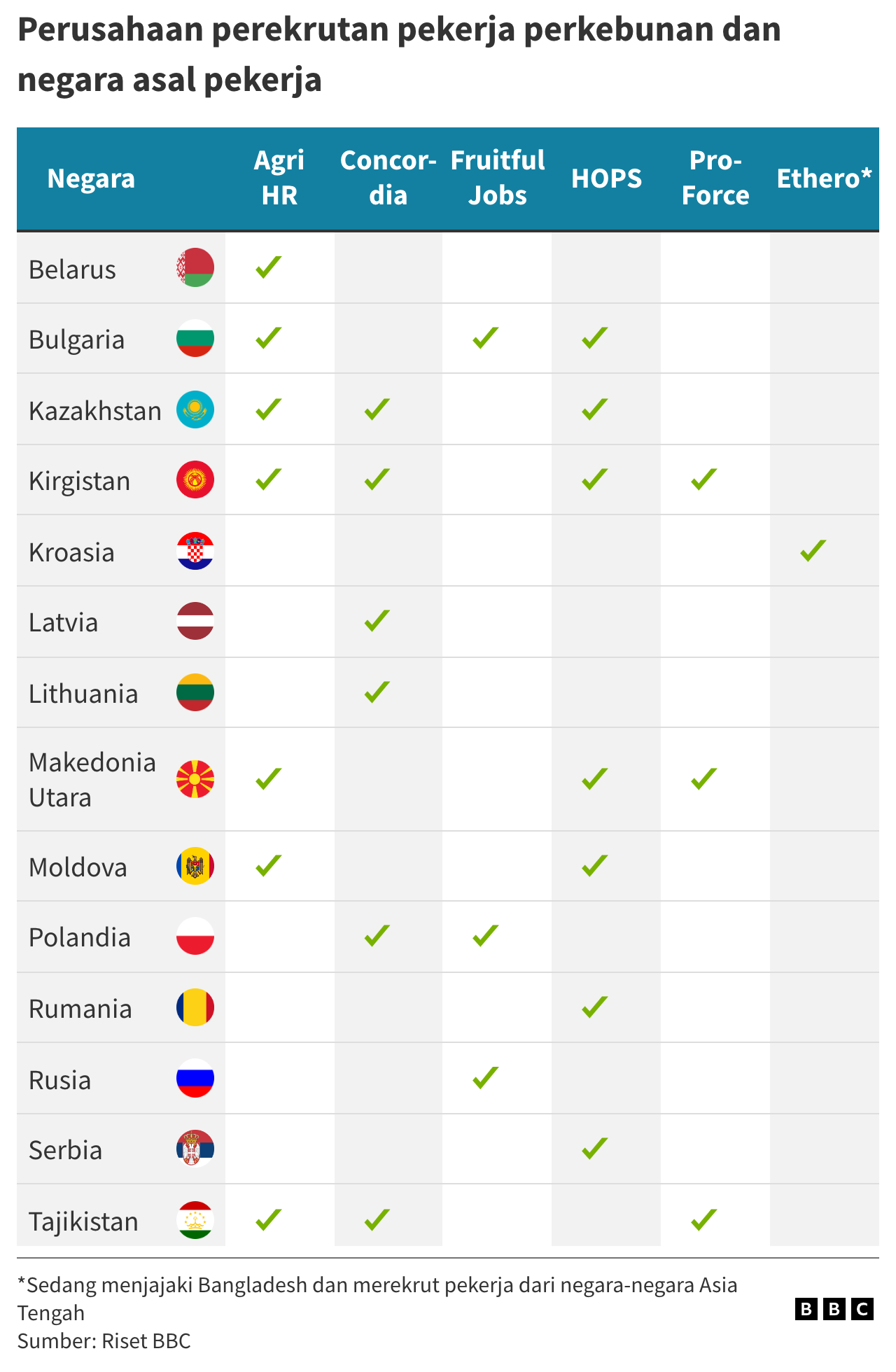
AGRI-HR mainly recruits citizens of Central Asian countries such as Kazakhstan, Kyrgyzstan, Tajikistan, Uzbekistan and also Bulgaria, Belarus, Moldova, North Macedonia. There are branch offices of AGRI-HR in those countries.
Jan-Willem Naerebout said that although there is a desire to recruit from Indonesia, there are two reasons why his company harbors the desire.
“In a recent meeting with the Indonesian Embassy, it was explained that the law in Indonesia requires employers to bear all labor costs. This means that it includes ticket and visa costs,” explained Naerebou.
Meanwhile, at this stage the plantations in England did not bear the costs incurred by workers.
“Second, AGRI-HR only recruits using its own recruiting and administration team. AGRI-HR has not yet set up a branch office in Indonesia. AGRI-HR will never cooperate with third-party agents in other countries for fear of bad recruiting practices or even the exploitation of prospective workers,” said director Jan-Willem Naerebout.
An agency that has also just received a license as a 2023 seasonal worker operator, HOPS displays an announcement on its website that it does not recruit from Indonesia.
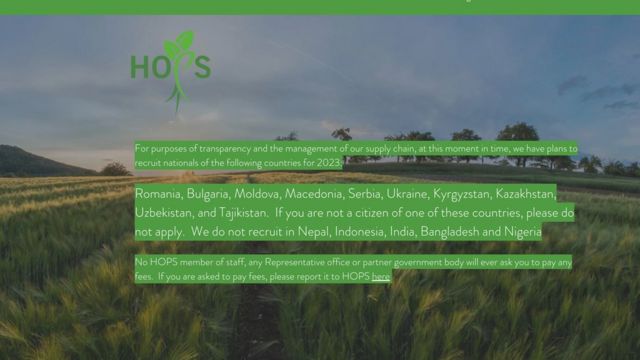
Concordia, a company that has long provided seasonal workers for the plantation and agriculture sectors, has made it clear that it does not recruit workers from Indonesia.
“We are not, and have never recruited from Indonesia, and have no plans,” said Concordia’s managing director, Simon Bowyer, to BBC News Indonesia.
Similar to AGRI-HR, Concordia brings in workers from Central Asia and the Balkans: Kazakhstan, Uzbekistan, Kyrgyzstan, Tajikistan, Armenia, Azerbaijan, Romania, Moldova, Serbia, Macedonia, Montenegro to name a few.
Meanwhile, the seasonal worker operator Fruitful Jobs brings in workers from Poland, Russia, Ukraine, Bulgaria.
Pro-Force also did not recruit from Indonesia but from Ukraine, Tajikistan, Uzbekistan, Kyrgyzstan, Macedonia.
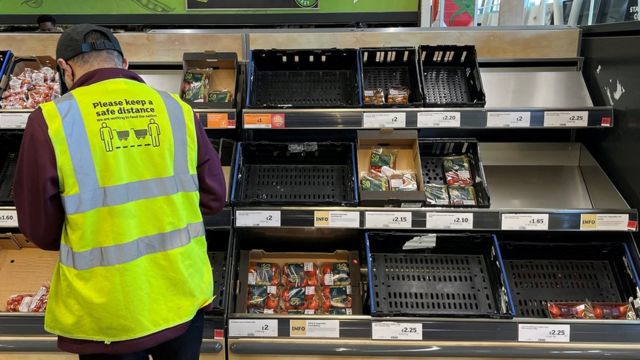
The sixth company we contacted was Ethero – also known by the trade name TELPASC. Long into supplying labor for agriculture, ornamentals and packaging, the Ethero consortium has become a new sponsor of seasonal workers from outside the UK this year.
The head of Ethero said that he had just been notified by the British Ministry of Home Affairs that the results of the tender for sponsorship of seasonal workers had been granted four weeks ago. Therefore, until now his team is still finalizing the recruitment strategy.
“When we first set up this consortium, from the start we didn’t plan to operate in Indonesia. Unfortunately, the situation was not helped by the AG case. The situation is complicated. We understand that there are many hard-working, good people in Indonesia who want to join this scheme,” explained the managing director of Ethero, Gareth Hughes, to BBC News Indonesia journalist in London, Rohmatin Bonasir.
What AG refers to is AG Recruitment, a recruitment company that lost its license as a seasonal worker agency. The revocation occurred following complaints that large placement fees were being charged to workers from Indonesia and Nepal until they became indebted. In addition, there are also cases of workers fleeing and seeking asylum.
Workers from the two countries were brought in by AG Recruitment, and similar to PMI, many Nepalese workers did not return home after their contracts and sought asylum, even more.
Gareth Hughes added, because he had just received a license, the consortium’s website had not yet been completed, so data on which countries were recruited would not be available until this weekend or next week.
“But what is clear, we have no intention of recruiting from Indonesia at this time. This situation might change in the future,” said Gareth Hughes on Monday (06/03).
Also read past related BBC Indonesia stories:
- Indonesian former fruit pickers become illegal immigrants and asylum seekers in the UK – ‘This is the easiest shortcut’
- Hundreds of Indonesian citizens fled to England, more than 1,200 workers from Indonesia were threatened with canceling their migration
- Over 200 Indonesian migrant workers in UK sent home – ‘Mortgage house, debt not closed’
Apart from the six employment agencies for the plantation sector, there are two seasonal labor providers specializing in the poultry sector.
They are RE Recruitment and Pro-Force which also hold licenses as operators of seasonal workers in the horticulture sector. On its website, RE Recruitment says recruitment is carried out by its team in Romania.
The working period in the poultry farming sector is shorter than in the plantation sector because it is only needed before Christmas and New Year’s holidays, from October to December.
The green light from the Indonesian government
The decision of all operators of the seasonal worker scheme not to cover migrant workers means that PT Al Zubara, as the party that handles recruitment in Indonesia, does not have a business partner at this stage.
Even though the company claimed to have made improvements. The arrangement involved, among other things, trimming the intermediary chain. The longer the brokerage chain, the higher the costs borne by prospective workers.
“Regarding the continuation of sending back Indonesian migrant workers, we have received a letter from the government regarding the re-assignment of seasonal workers (SW) to the UK. We are preparing the requirements, one of which is having a GLAA license,” said Director of PT AMI, Yulia Guyeni on Saturday (04 /03).
The GLAA is a body that deals with labor and labor rights violations. It is the GLAA that issues permits and then oversees all recruiting firms, including seasonal worker operators.
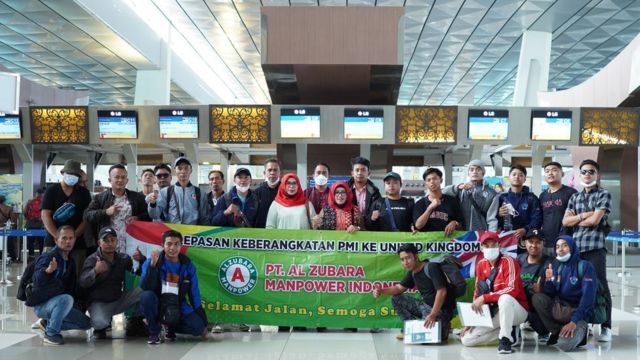
To BBC News Indonesia, Yulia Guyeni further said: “The large number of Nepali migrant workers who have fled is one of the reasons our agency AG Recruitment has been temporarily suspended until an undetermined time and many migrant workers have applied for asylum. For this reason, we are trying to organize work. the same as other agencies, one of which is Ethero.”
This information was provided two days before we received confirmation from Ethero. And, as Ethero managing director Gareth Hughes says, Indonesia is not a recruiting destination, at least for now.
“At this point in time we have never negotiated with anyone from Indonesia,” Gareth Hughes reiterated.
Meanwhile, the Director for PMI Placement and Protection (P2MI) at the Ministry of Manpower, Rendra Setiawan, said that sending migrant workers back to England had actually received a green light from the government. This is proven by the issuance of a circular letter by the Ministry of Manpower dated 22 February 2023.
“It can be continued as long as P3MI (Indonesian Migrant Worker Placement Company) meets the requirements according to the Ministry of Manpower circular,” he said on Monday (06/03).
Among the requirements set out in the circular letter is that a placement company that will send PMI to the UK must have an agreement with a business partner in the country who has a permit from the Gangmasters Labor Abuse Authority as well as a license as a seasonal worker scheme operator.
So far, not a single Indonesian company has held its own GLAA license, even though Yulia Guyeni said earlier that her party is working on it. The processing process usually takes more than three months.
The lack of a permit is itself a cause for deep concern among UK stakeholders, from recruiting companies to plantations to supermarkets to legal authorities, says British migrant workers’ rights specialist Andy Hall.
“If there are no agents who have a GLAA license in Indonesia, who will do the monitoring? There is no accountability and there is no rule of law in Indonesia. That’s what everyone is thinking right now. I think it’s too high a risk for them,” he explained.
Given the many cases of PMI being forced to borrow large sums of money, pawning land titles or selling assets to finance their departure in the first year’s shipments, relevant parties in the UK are concerned that vulnerable workers are being taken advantage of.
“In the UK system, that’s very risky of causing corruption and there are governance issues with people that shouldn’t be involved,” Andy Hall added.
Also read past related BBC Indonesian stories:
Workers are confused and hopeless
The decision of the six British companies that have permits to bring in foreign workers under the plantation sector seasonal worker visa scheme not to take workers from Indonesia has made many PMIs confused. Even though some of them have received calls from plantation companies that employ them in the 2022 harvest season.
“Confused, what can you do? If you say it’s a loss, it’s a loss because the costs are already too high,” said Candra Septiana, a PMI who received a call from her plantation near Norwich city, about 158 km from London.
Without an official agent in England, Candra is still unable to work even though she has been offered a vacancy on a plantation.
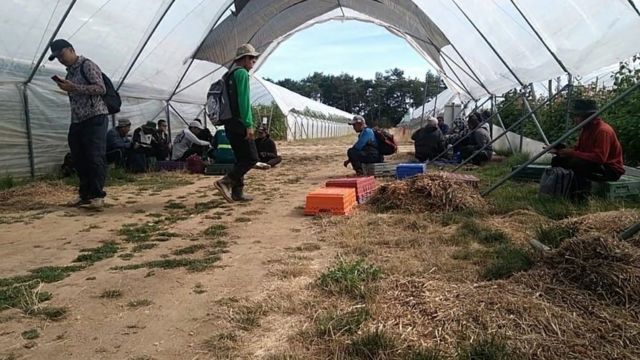
At the plantation, Candra worked as a cleaner at existing facilities and said she enjoyed working there.
As part of a two-year contract with PT Al Zubara, Candra hopes that he can still depart, even though the destination country is different.
“Even though I can’t go there (England), at least it will be transferred to another country, for example Australia. At least don’t give up hope. At least for the rest of my contract I can’t go to England. So there is a place to work. confused,” he said.
Candra admits that he spent a lot of money to get a job abroad. Initially, he enlisted to work in Poland and Slovakia. He shifted his focus after the opportunity to work in England in 2022.
In addition to the 1,100 Indonesian migrant workers who have worked in the UK like Candra Septiana, there are at least 4,000 new people who registered with PT Al Zubara before registration closed this year, according to PT Al Zubara’s director, Yulia Guyeni.
In Bali, Robby Cahyadi is also interested in working in the plantation sector in England after seeing more than 100 people depart through a job training institute (LPK) in the province in 2022.
Robby has spent tens of millions to attend training at the LPK. At the same time, he also received a letter of notification from the Bali branch of PT Al Zubara that the workers’ departure to England could not be carried out until an undetermined time.
“I was promised by our LPK that they would depart in March,” said Robby, adding that he felt hopeless.
Based on labor regulations, LPKs are actually not allowed to recruit, but only carry out training.
Migrant worker problem researcher Andy Hall suggests that the Indonesian government take a diplomatic approach, as has been done by other countries.
“The secretary of labor must visit the UK, as other labor ministers do, if this is to be resolved. Every week, scores of labor ministers travel to the UK to try to get their workers recruited under the seasonal worker scheme.”
BBC News Indonesia is still waiting for an answer to this question from the Minister of Manpower Ida Fauziyah.
Legal steps
Due to waiting in uncertainty, dozens of PMIs have submitted a power of attorney to the Indonesian Migrant Workers Federation (F-Buminu) of the Indonesian Muslim Workers Union (Sarbumusi). The purpose of the power of attorney is twofold, as stated by the head of the legal and advocacy division, Abdul Rahim Sitorus, who is also the coordinator of the team of lawyers for the UK agricultural PMI case.
“We demand a return of the excess placement fees borne by PMI, according to BP2MI Regulation Number 9 of 2020 that Indonesian migrant workers cannot be charged with the placement process.
“We also demand compensation for PMI’s salary, the remaining six months of work according to the contract made between PT AMI, AG Recruitment and workers,” he explained.
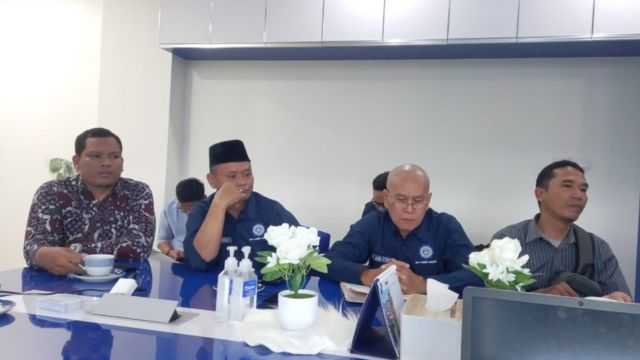
According to Abdul Rahim Sitorus, the majority of PMI who asked for legal assistance were those who were no longer employed before their six-month contract ended.
The director of PT AMI, Yulia Guyeni, responded to the planned lawsuit by saying that the legal step was the right of the workers “but it would be wise for us to see from all sides that the problem arises because it is not caused by the fault of PT AMI, but rather the problem is the high rate of migrant workers fleeing of course we don’t know the aims and objectives of working in England.”
Director of Bina P2PMI Kemnaker, Rendra Setiawan, previously acknowledged that job opportunities in the UK have the potential to be developed which can be utilized by Indonesian job seekers.
The minimum wage for seasonal workers in the UK was recently raised to £10.42 or around Rp 190,000 per hour. This amount is gross wages, before deducting income tax and national insurance contributions (NI).
Junior Minister for Food, Agriculture and Fisheries, Mark Steven Spencer, said the increase in wages will apply to seasonal workers from April. At the National Farmers’ Union (NFU) conference on February 21, Spencer also announced that seasonal workers are guaranteed a minimum of 32 hours per week.
The UK government is providing a quota of 45,000 visas for seasonal workers and a reserve quota of up to 10,000 if needed for the 2023 harvest season. The visa quota is then divided among the six seasonal worker visa operators. In the first year, workers get a visa for six months then return to their country of origin, and return to work for another six months in the second year.
Apart from that number, there is a separate quota of 2,000 work visas in the livestock sector. These are the only two sectors open to seasonal workers so far.

Farmers have long depended on workers from abroad, mainly to care for and harvest fruit and vegetables. The need for seasonal workers is high due to Brexit or the UK leaving the European Union.
Before Brexit, many workers came from eastern European countries. Likewise, before the outbreak of the Ukrainian war, many citizens of that country filled vacancies in labor-intensive sectors.
In addition to labor constraints, the plantation sector has also been hit hard by the surge in production costs.
Apple orchards in Kent, a food-basin in south-east England, were left to fall into disrepair. This is because harvesting costs, electricity rates, transportation and packaging have jumped 23%, not comparable to the increase in prices received by farmers from supermarkets, which is only 0.8%, said the Association of Apple and Pear Growers.
See Also: 30th March 2023: UK retailers urged to compensate Nepalese and Indonesian ex-farm workers.
Related Background News and Articles:
LATEST KEY UPDATE: Farm workers on UK seasonal visas to be guaranteed 32 hours a week (Guardian, 24th Feb 2023)
1. Nepal squanders overseas seasonal work opportunities (Kathmandu Post, 5th Mar 2023)
2. AG Recruitment, UK recruiter of debt-hit Indonesian and Nepali migrant workers, loses seasonal workers scheme license following forced labour related allegations, worker abscondments and asylum claims (Guardian, 10th Feb 2023)
3. UK farmers stop recruiting Nepalese workers after exploitation warning (Financial Times, 28th Jan 2023)
4. Home Office accepts recommendations in Chief Inspector’s report on immigration system as it relates to the agricultural sector (Freeths, 16th Jan 2023)
5. Immigration: Investors warn food companies about risk of forced labour on UK farms (Financial Times, 19th Dec 2022)
6. Investor statement on the UK Seasonal Worker Scheme (Public Investor Statement, 19th Dec 2022)
7. Hundreds of Indonesian fruit pickers in UK seek diplomatic help (Guardian, 2nd Dec 2022)
8. Seasonal worker visa puts migrants at risk of exploitation, say supermarkets (Guardian, 2nd Dec 2022)
9. Seasonal fruit pickers from Nepal left thousands in debt after being sent home early from UK farms (Guardian, 13th Nov 2022)
10. Indonesia to investigate claims fruit pickers in UK seasonal agricultural workers scheme charged thousands to work in Kent (Guardian, 29th Aug 2022)
